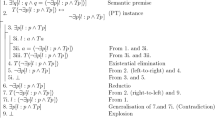Stephen Read's criticism of Buridan's solution of the Liar Paradox is based on the charge that while this solution may avoid inconsistency, it does so at the expense of failing to provide a theory of truth. This paper argues that this is one luxury Buridan's logical theory actually can afford: since Buridan does not define formal consequence in terms of truth (and with good reason), his logic simply does not need it. Therefore, Buridan's treatment of the paradox should be regarded as an attempt to eliminate a problem concerning the possibility of the consistent use of semantic predicates under the conditions of semantic closure, rather than as an attempted solution of a problem for a theory of truth. Nevertheless, the concluding section of the paper argues that Buridan's solution fails, because it renders his logical theory inconsistent. A postscript, however, briefly considers an interpretation that may quite plausibly save the consistency of Buridan's theory.
Preview
Unable to display preview. Download preview PDF.
Similar content being viewed by others
References
[1] S. L. Read (2002) The liar paradox from John Buridan back to Thomas Bradwardine, Vivarium, 40: 189–218.
S. L. Read (2008) The Truth Schema and the Liar, c. 1
[3] G. Klima (2004) Consequences of a closed, token-based semantics: the case of John Buridan, History and Philosophy of Logic, 25: 95–110.
[4] C. Normore (1985) Buridan's ontology, in: J. Bogen and J.E. McGuire (eds.) How Things Are. D. Reidel Publishing Company: Dordrecht-Boston-Lancaster, pp. 189–203.
[5] G. Klima (1999) Buridan's logic and the ontology of modes, in: S. Ebbesen and R.L. Friedman (eds.) Medieval Analyses in Language and Cognition. Copenhagen: The Royal Danish Academy of Sciences and Letters, pp. 473–495.
[6] J. Buridan (2001) Summulae de Dialectica (henceforth: SD), an annotated translation with a philosophical introduction by Gyula Klima. New Haven: Yale University Press, pp. 829–831.
J. Buridan (1964) In Metaphysicen Aristotelis Questiones Argutis-simae (henceforth: QM), Paris 1588 (actually 1518). Reprinted as Kommentar zur Aristotelischen Metaphysik, Minerva, Frankfurt a. M, 1964, lb. 6, q. 8.
J. Buridan (1994) Questiones Elencorum (henceforth: QE), R. van der Lecq and H.A.G. Braakhuis (eds.), Nijmegen, Introduction, Sect. 3.2.
[9] G. Klima (1993) ‘Debeo tibi equum’: A reconstruction of Buridan's treatment of the sophisma, in S.L. Read (eds.) Sophisms in Medieval Logic and Grammar: Acts of the 9th European Symposium for Medieval Logic and Semantics. Dordrecht: Kluwer, pp. 333–347.
[10] G. Nuchelmans (1973) Theories of the Proposition: Ancient and Medieval Conceptions of the Bearers of Truth and Falsity. Amsterdam: North-Holland.
L.M. De Rijk (1962–1967) Logica Modernorum: A Contribution to the History of Early Terminist Logic, 3 vols. Assen.
[12] Buridan (2006) Syncategoremata, in: K. Brown (ed.) Elsevier's Encyclopedia of Language and Linguistics, vol. 12, 2nd ed. Oxford: Elsevier, pp. 353–356.
S. L. Read (2002) Medieval theories: properties of terms, in: E.N. Zalta (ed.) The Stanford Encyclopedia of Philosophy (Spring 2002 Edition), URL = http://plato.stanford.edu/archives/ spr2002/entries/medieval-terms/.
[14] G. Klima (2001) Existence and reference in medieval logic, in: A. Hieke and E. Morscher (eds.) New Essays in Free Logic. Dordrecht: Kluwer, pp. 197–226.
J. Buridan. Quaestiones in primum librum Analyticorum Posterio-rum, q. 10 (unpublished edition by H. Hubien).
[16] Albertus de Saxonia (1974) Perutilis Logica (Venice, 1518; reprint). Hildesheim: Georg Olms Verlag, f. 4, va.
P.V. Spade (2005) Insolubles, in: E.N. Zalta (ed.) The Stanford Encyclopedia of Philosophy (Fall 2005 Edition), URL = http://plato. stanford.edu/archives/fall2005/entries/insolubles/.
[18] J. Buridan (1976) Tractatus de Consequentiis, in: H. Hubien (ed.) Philosophes Médiévaux, vol. 16. Louvain: Publications universi-taires, pp. 21–22.
[19] G. Klima (2004) John Buridan and the force-content distinction, in: A. Maierú and L. Valente (eds.) Medieval Theories On Assertive and Non-Assertive Language, Acts of the 14th European Symposium on Medieval Logic and Semantics. Rome: Olschki, pp. 415–427.
Author information
Authors and Affiliations
Editor information
Editors and Affiliations
Rights and permissions
Copyright information
© 2008 Springer Science + Business Media B.V
About this chapter
Cite this chapter
Klima, G. (2008). Logic Without Truth. In: Rahman, S., Tulenheimo, T., Genot, E. (eds) Unity, Truth and the Liar. Logic, Epistemology, and the Unity of Science, vol 8. Springer, Dordrecht. https://doi.org/10.1007/978-1-4020-8468-3_5
Download citation
DOI: https://doi.org/10.1007/978-1-4020-8468-3_5
Publisher Name: Springer, Dordrecht
Print ISBN: 978-1-4020-8467-6
Online ISBN: 978-1-4020-8468-3
eBook Packages: Humanities, Social Sciences and LawPhilosophy and Religion (R0)




